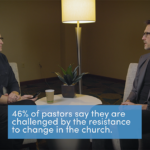
How often do Christians get comfortable with the way things are in their walk with God? What happens when Christians think we’re good enough?
By Scott McConnell
My wife and I are in the process of selling our house. We thought we had kept it in good shape over the more than 25 years we have lived there, but you look at a house differently when you start looking at it through the eyes of potential buyers. After talking with a realtor, there was a furious and not inexpensive three-week period of fixing, cleaning, decluttering, and making improvements.
Even once we had reached the point of being satisfied with the pictures and were ready for buyers to come through the house, we still saw imperfections. We couldn’t remember the last time we had cleaned some places. Time had not been kind to other things. Tasks we had previously put off needed to be addressed. As our perspective changed, we realized our maintenance and upkeep of our home had not been good enough.
Good enough
Our lives are not unlike this house. We go through long periods of time thinking we are OK spiritually. When people ask, we say we are good. When a sermon confronts sin, we conclude it is for someone else. When it is time to celebrate the Lord’s Supper, we have to think hard to find anything to confess.
I must admit I often get comfortable with the way things are in my walk with God. I ignore and even kind of like some of the clutter in my life that has nothing to do with my relationship with Christ. I fail to protect the tender moments in which I just enjoy being with God. I go too long without polishing my praise to Him.
So, what happens when Christians think we’re good enough?
1. We don’t walk in prayer
One of the first things to fade spiritually is constant prayer. According to research conducted for the Discipleship Pathway Assessment, Protestant churchgoers are quick to say they set aside time for prayer of any kind every day (59%) or a few times a week (23%).
But other questions on the same survey exposed lower frequencies for specific kinds of prayer. For example, 38% of Protestant churchgoers set aside time for private worship, praise, or thanksgiving to God every day, and 29% practice it a few times a week. This reveals we are often not committing everything to Him in prayer. While we maintain some time alone with God, we walk into situations without having prayed about what we are stepping into.
38% of Protestant churchgoers set aside time for private worship, praise, or thanksgiving to God every day, and 29% practice it a few times a week. Click To TweetThis week it was my middle school boys’ Life Group at church. The lesson was fittingly on spiritual warfare. But 10 minutes in, I found myself trying to reign in verbal warfare among the teens. Afterward, I had to admit, I hadn’t prayed for them the week before. I thought I was in a good enough spot to teach a lesson but realized I had not spiritually prepared through prayer.
2. We don’t live show-ready
Once our house was listed for sale, we had to be ready at a moment’s notice to let someone tour the house. This would never have been possible when our kids were younger! But even now, living show-ready is incredibly hard to do. The perfection that a buyer desires is hard to achieve and just as hard to maintain.
The truth has not been lost on me that my life before God is often not show-ready either. I know He demands holiness from His followers, but I am not any more perfect than my house is. If Jesus appeared today, I would be ashamed of the distance that has slipped into my relationship with Him. I know there will be a day like that.
Almost two-thirds (64%) of Americans share that belief, agreeing “there will be a time when Jesus Christ returns to judge all the people who have lived.” Churchgoers are much more likely to believe this. Those attending religious services each month are more likely to agree than those who don’t (89% v. 45%).
Maintaining an eternal perspective encourages us to be show-ready. This upcoming in-person meeting with Christ should create urgency in our walk with Him. We are ready not because we’ve enhanced our spiritual appearance but because we’ve stayed close to Christ relationally.
3. We lose our appreciation of grace
When we started feeling content that our house was ready to be toured, the tray in the dishwasher broke. I noticed it immediately. I thought, “Even when I’m doing my best to maintain this home, things are still falling apart. And the appliance was only three years old!”
When I am in a season in which I am not noticing how chronic my spiritual imperfections are, I am also missing out on recognizing the need for and the presence of God’s grace in my life. Additional research conducted for the Discipleship Pathway Assessment revealed that “confessing one’s sins and wrongdoings to God and asking for forgiveness” is something many Protestant churchgoers do daily (49%) or several times a week (24%).
This practice of frequent confession and living in grace is directly related to higher levels of Bible engagement, obeying God and denying self, exercising faith, and seeking God (four of the eight biblical signposts measured in the assessment).
“Frequent confession and living in grace is directly related to higher levels of Bible engagement, obeying God and denying self, exercising faith, and seeking God.” — @smcconn Click To TweetWhen I feel the Holy Spirit nudging me to act differently or immediately notice when I break God’s commands, then I am much more likely to also acknowledge I don’t deserve His forgiveness. I don’t deserve Him making up for my weaknesses. But His grace covers me.
While a lot of memories are passing by me as we move from this house, the lessons of this move point to the need for regular maintenance and cleaning. My spiritual life will never be perfected in this life. So, I need to take each step in prayer, having an eternal perspective and being grateful for God’s grace.
For permission to republish this article, contact Marissa Postell Sullivan.












